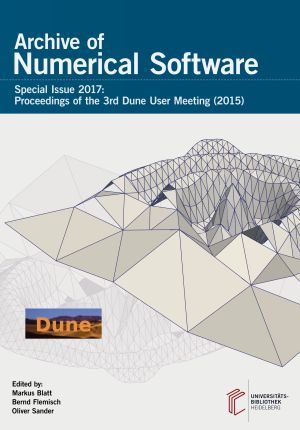Zitationsvorschlag
Lizenz (Kapitel)

Dieses Werk steht unter der Lizenz Creative Commons Namensnennung - Weitergabe unter gleichen Bedingungen 4.0 International.
Identifier (Buch)
Veröffentlicht
The DUNE-FEM-DG module
Abstract In this paper we discuss the new publicly released Dune-Fem-DG module. This module provides highly efficient implementations of the Discontinuous Galerkin (DG) method for solving a wide range of non linear partial differential equations (PDE). The interfaces used are highly flexible and customizable, providing for example mechanisms for using distributed parallelization, local grid adaptivity with dynamic load balancing, and check pointing. We discuss methods for solving stationary problems as well as a matrix-free implementation for time dependent problems. Both parabolic and first order hyperbolic PDE are discussed in detail including models for compressible and incompressible flows, i.e., the Navier-Stokes equations. For the spatial discretization a wide range of DG methods are implemented, ranging from the standard interior penalty method to methods like LDG and CDG2. Upwinding numerical fluxes for first order terms are also available, including limiter based stabilization for convection dominated PDEs. For the temporal discretization Runge-Kutta methods are used, including higher order explicit, diagonally implicit and IMEX schemes. We discuss asynchronous communication, shared memory parallelization, and automated code generation which combined result in a high floating point performance of the code.
Keywords Numerical Software, Dune, Discontinuous Galerkin Schemes, Hyperbolic problems, Elliptic roblems, Parabolic problems, Euler, Navier-Stokes, Advection-Diffusion, Stokes, Poisson



